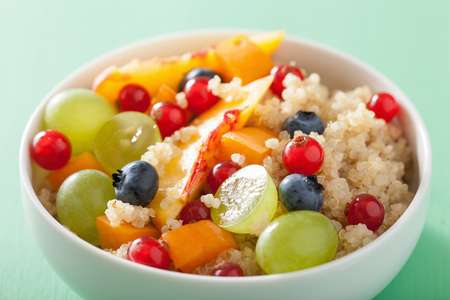Your Pregnancy Diet

In this article, you will find:
In recent years, much has been learned about what constitutes a healthy diet in pregnancy. In addition to the importance of nutrients such as folic acid, there is mounting evidence that a person's health may be influenced by the mother's diet in pregnancy, including whether particular nutrients were received at certain times. Current thinking is that good nutrition in pregnancy may reduce a baby's future risk of diseases such as obesity, diabetes, and heart disease.
In addition to influencing your baby's health, good nutrition in pregnancy also optimizes your health, helping you to deal with the demands of pregnancy.
Getting the right balance of protein, carbohydrates, and fats in pregnancy is simple, since the ratios are the same in pregnancy as at other times: 45-65 percent of your calories should come from carbohydrates; 20-35 percent from fats; and 10-35 percent from protein. The components of these nutrients don't need to be in this exact ratio for each meal, or even every day, but you should aim to achieve this balance over the course of a week. A diet that includes plenty of vegetables, fruits, whole grains, and good proteins and fats will automatically contain the proper mix of nutrients.
Carbohydrates are an important source of fuel for you and for your baby since they are broken down into glucose, which passes easily across the placenta. Try to get six servings a day, a serving being equivalent to a slice of bread, 2 oz (60 g) of cereal, or five crackers.
Carbohydrates are divided into two subgroups: refined and unrefined. In general, white is bad when it comes to carbohydrates, since refined foods such as white rice and white breads are rapidly broken down and enter the bloodstream in the form of a spike of glucose. It is thought that this spike may have health risks for mother and baby, producing larger babies with a subsequent risk of obesity later in life.
Unrefined carbohydrates are less processed, so they break down more slowly in the bloodstream and release glucose steadily. They are also a good source of fiber, which helps prevent constipation. These are a healthier choice, and at least half, if not all, of your carbohydrates should come from unrefined (whole grain) sources. such as whole-wheat or multigrain bread; brown rice, whole-wheat pasta, and cereals.
Protein is essential for the growth of the baby and the placenta, as well as for your health. Pregnant women need around 6-6 1/2 oz each day. Aim for two to three servings of protein-rich foods a day, a typical serving being 3 oz (85 g) red meat, or 5 oz (150 g) fish. Since most adults get about 3 1/2 oz (100 g) of protein daily, there is usually no need to increase your intake, especially if you have protein at each meal. If you're vegetarian, in addition to protein at each meal, you should have a protein-containing snack. If you're having twins or more, ask your doctor how much protein to consume and when breast-feeding, 6 1/2 oz (185 g) daily.
Choose protein sources that contain less saturated fat, such as skinless chicken, lean beef and pork, tofu, low-fat cheese and yogurt, and skim milk. Fish, nuts, and seeds contain healthier unsaturated fats although your intake of some fish should be limited since they contain mercury, which could be harmful to your baby.
Fats contain vitamins and contribute to the healthy development of cells. However, although fats make a useful contribution to overall nutrition, their intake needs to be limited. Choose healthier unsaturated fats, found in foods such as fish and some types of oil, over unhealthy saturated fats found in whole milk dairy products, meat, or trans fats found in processed foods.
Omega 3 fatty acids
Studies suggest that the development of the baby's nervous system may be boosted by omega 3 fatty acids, the richest source of which is found in fatty fish. Avoid fish that are high in mercury and opt instead for salmon and anchovies, which are good, safe sources of omega 3 fatty acids. Wild salmon is very rich in omega 3, but farm-raised salmon is also a good source. Other sources include omega 3-enriched eggs, flaxseed, flaxseed oil, walnuts, canola oil, and omega 3 supplements and prenatal vitamins containing omega 3 fatty acids.
These are an important component of the diet since they provide a good supply of proteins and fats, as well as calcium and some vitamins. Calcium is essential for the healthy development of bones and teeth. Opt for low-fat dairy products and low-fat or skim milk. Aim for 2-3 servings each day, a typical serving being 1 oz (30 g) of hard cheese, or 1 cup (200 ml) milk.